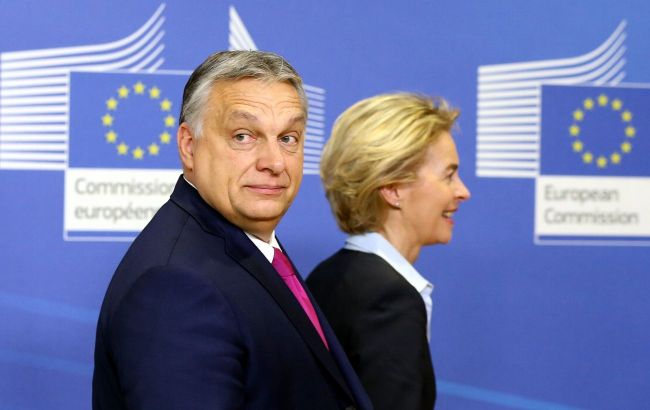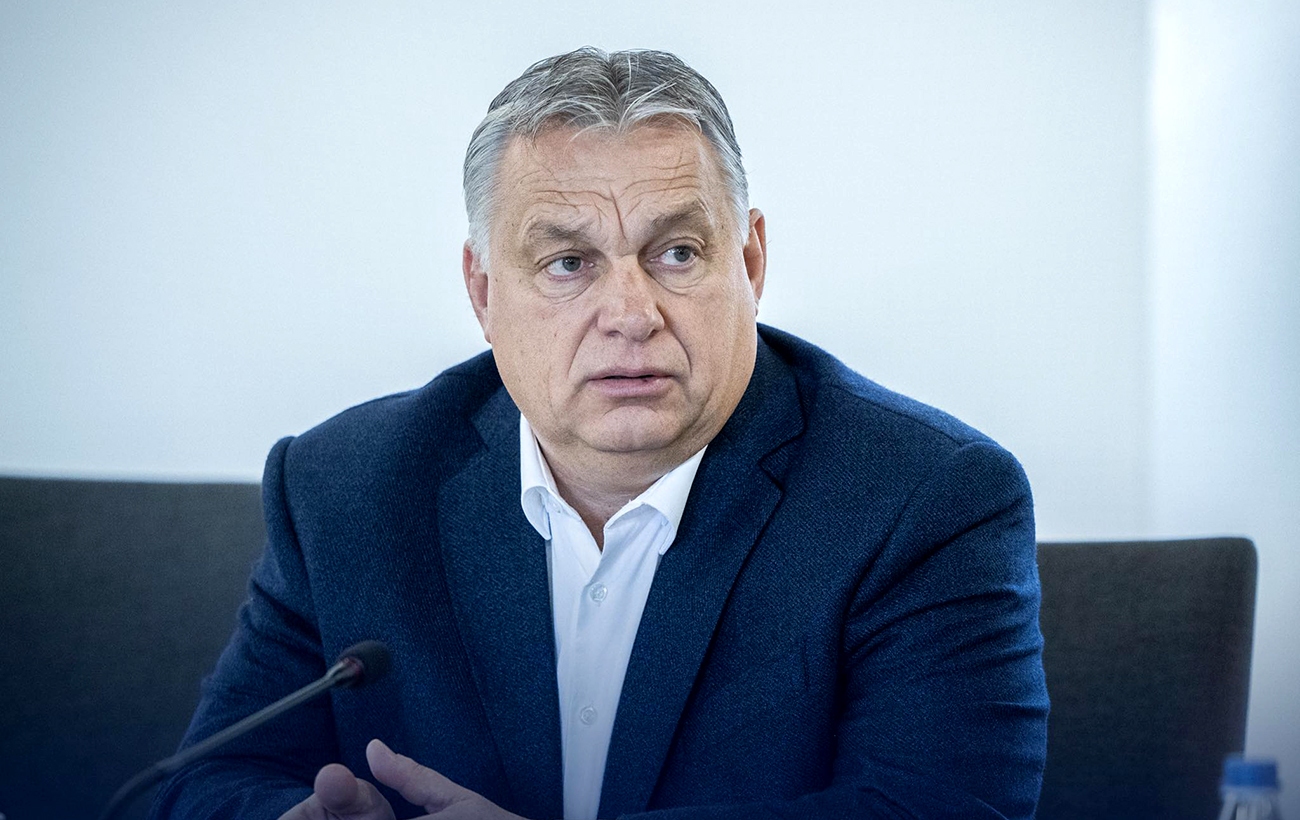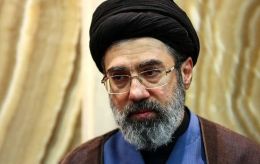EU's €50 billion aid package: Negotiations on Ukraine and potential stripping of Orban's veto power
 Hungarian Prime Minister Viktor Orban and President of the European Commission Ursula von der Leyen (Photo: Getty Images)
Hungarian Prime Minister Viktor Orban and President of the European Commission Ursula von der Leyen (Photo: Getty Images)
The European Parliament tomorrow, on January 18, 2024, intends to vote on a resolution strongly urging the deprivation of Hungary's voting rights in the EU Council. This move could potentially be a step towards unlocking the 50 billion euro aid package for Ukraine.
For more details on the package, those hindering its approval, and when a final decision will be made, read RBC-Ukraine's material.
The material was prepared using information from Politico, Euractiv, Financial Times, data from the European Commission's website, and the Ukrainian government portal. Statements from the President of the European Commission Ursula von der Leyen, Hungarian Prime Minister Viktor Orban, Ukrainian President Volodymyr Zelenskyy, and Prime Minister Denis Shmyhal were also taken into account during the preparation of the material.
Summary of the 50 billion euro package for Ukraine:
The European Commission proposed the creation of a special fund called the Ukraine Facility in June, allocating up to 50 billion euros for the period 2024-2027. The Ukraine Facility aims to support macrofinancial stability, recovery, and modernization while implementing key reforms for Ukraine's EU accession. It also focuses on transitioning to a green, digital, and inclusive economy in line with EU rules and standards.
The program consists of three components:
- A plan for the Ukraine Facility with a list of priority reforms, accompanied by quarterly financial support based on progress indicators.
- A special investment instrument covering risks in priority sectors, with funding provided through international institutions such as the EBRD and EIB.
- Technical assistance and other measures to facilitate the implementation of structural reforms on the path to full EU membership for Ukraine.
The 50 billion euros over four years include both grants and loans, with plans to cover up to 45% of Ukraine's financial needs by 2027, according to statements by European Commission President Ursula von der Leyen.
It's crucial to note that the funds will be allocated only after amendments are made to the already approved seven-year EU budget, requiring approval from European leaders.
.jpg) Photo: President of the European Commission Ursula von der Leyen presented the plan for 50 billion euros for Ukraine in June 2023 (Vitalii Nosach/RBC-Ukraine).
Photo: President of the European Commission Ursula von der Leyen presented the plan for 50 billion euros for Ukraine in June 2023 (Vitalii Nosach/RBC-Ukraine).
In October, the European Parliament supported the creation of the Ukraine Facility. However, at the December European Council summit, the final decision was blocked by Hungary, and Sweden mentioned the need to obtain technical approval from its parliament, while the rest expressed support.
By the end of the year, the Ukrainian government approved a draft plan for the Ukraine Facility with ongoing developments. Prime Minister Denys Shmyhal stated that the final conditions would be determined after the special summit on February 1, 2024. The agreement on the final version will grant access to the 50 billion euros resource, with the majority (39 billion euros) directed toward ensuring macrofinancial stability.
Last week, European ambassadors approved a mandate for negotiations with the European Parliament, which, however, does not include discussions on the funding volume, and this will be subject to further negotiations.
"The EU Council's decision to start negotiations on the creation of the Ukraine Facility program is another confirmation of our partners' unwavering support for Ukraine. We adhere strictly to the agreed-upon plan. In February, we expect updates on the EU's multi-year financial program until 2027, as well as the final approval of the Ukraine Facility, which will give a full start to the program and allow obtaining the necessary macrofinancial assistance," stated the First Deputy Prime Minister and Minister of Economy, Yulia Svyrydenko.
There are "positive signals." What is known about the terms and what influences them
External assistance during the war is critically important for Ukraine. The European Union and the United States are the main donors, but funding from Washington has been suspended due to political disagreements in Congress. Money from Brussels saved the situation until the end of 2023 when the last tranche of 1.5 billion was transferred (from the program that was in effect at that time, for 18 billion euros). It is expected that the program of 50 billion euros, designed until 2027, will replace it.
It is expected to help cover the budget deficit for the next months. While the resilience is there. As the head of the financial committee of the Ukrainian Parliament, Danylo Hetmantsev, said in an interview with RBC-Ukraine, the country would calmly go through January and February.
"I am not worried about January and even February," he noted, adding that external financing is expected at best in March or even in April.
All hopes are pinned on the European Summit on February 1, 2024. However, the threat of a repeat Hungarian veto remains. In this case, there is a contingency plan for up to 20 billion euros, which will allow bypassing the objections of Hungarian Prime Minister Viktor Orban. Other alternatives are also being considered, although the only decision regarding the 50 billion package remains a priority.
Euractiv has reported, based on its sources, that regardless of the final conditions, the EU has promised to provide funding to Ukraine no later than March.
 Photo: Ukrainian President Volodymyr Zelenskнy hopes that a decision on assistance will be made in the coming weeks (Getty Images)
Photo: Ukrainian President Volodymyr Zelenskнy hopes that a decision on assistance will be made in the coming weeks (Getty Images)
On the eve of the World Economic Forum in Davos, President Volodymyr Zelenskyy stated that the allocation of new aid packages was a matter of weeks.
"I have positive signals that Europe is supporting us and I think we will also manage to solve the issue of aid in Congress," he said.
The phrase "positive signals from Europe" does not mean that the package for Ukraine will get the green light. The European Council decides strategic issues on the principle of consensus. That is, one vote against can block the initiative.
This principle ensures that no EU member or group of countries can dominate others. Hungary is not the first to abuse the right of veto; in November, the European Parliament already advocated replacing consensus with a qualified majority mechanism, but it is unlikely that EU leaders will dare to do so.
However, as Politico writes, official Budapest is signaling readiness to lift the blockade. According to several European diplomats and officials, the parties are approaching a compromise. Orban's veto in December prompted Brussels to consider abandoning the principle of unity, but since then, both sides have stepped back from the brink and are actively negotiating.
There is no agreement yet on what concessions Hungary may make. But within the EU itself, they are confident that they will be able to agree on 50 billion euros for Ukraine in the next couple of weeks, the new agency writes, citing diplomats and officials who spoke on condition of anonymity due to the sensitivity of the negotiations.
Will Orban lose his vote? Why does he block aid to Ukraine
The progress is likely related to news from the European Parliament. On January 9, a petition to deprive Orban of the right to vote in the EU Council was initiated there, and within four days, it gained the required number of signatures. According to MEP Petri Sarvamaa, due to the Hungarian prime minister, the decision-making mechanism in the EU has become ineffective.
"It’s now or never. The only way to make it work is to withhold Orban of his right to vote at the Council," he added.
It is expected that with the consent of the majority, consisting of socialists (S&D), the Greens/EFA group, the center-right European People's Party, liberals from the Renew group, and the Left group, the European Parliament will already tomorrow, January 18, approve a sharp resolution.
Its two key points are a call to the EU Council to initiate the process of depriving Hungary of the right to vote under Article 7.2 of the EU treaty and to conduct an investigation into the legality of the decision of the European Commission to unfreeze Hungarian funds. Note that Article 7.2 provides that the European Parliament has the right to call on Hungary to respond to violations of the rule of law. After that, EU leaders can deprive the country of its vote.
On the eve of the December summit, the EC unfroze 10.2 billion euros for Budapest, hoping to appease Orban, who threatened to block the start of negotiations on Ukraine's accession to the EU. According to MEPs, the legality of the thaw should be checked in court, as it was not based on improvements in Hungary's judicial system.

Photo: Western media report on Viktor Orban's readiness to negotiate, but his public rhetoric has not changed so far (Getty Images).
Pressure on Orban is likely beginning to yield results. According to Politico, the Hungarian side has indicated that it may lift the veto on aid to Ukraine on the condition that funding is reviewed annually.
Budapest's demands boil down to the following: the European Union rejects a four-year program in favor of allocating grants and loans worth 12.5 billion euros annually. In total, this would amount to 50 billion euros over the period from 2024 to 2027. Despite essentially involving the same 50 billion euros, in practice, this would allow Orban to block funding again, demanding further concessions.
On the one hand, the idea signifies a significant departure from the previous rhetoric when the Hungarian Prime Minister opposed any grants for Ukraine. On the other hand, European politicians are skeptical because annual reviews won't provide Kyiv with confidence for the future, as Politico notes.
Meanwhile, at least in public statements, Viktor Orban remains steadfast. Recently, he reiterated his opposition to changes in the EU budget for the sake of multi-billion aid to Ukraine.
"If we want to help Ukraine, which I think we need to do, we have to do it in a way that doesn't harm the EU's budget...But to give away 50 billion euros from the EU budget for four years in advance is a violation of the EU's sovereignty and national interests. We do not even know what will happen in a quarter of a year. If Brussels accepts this, then there'll be help for Ukraine, outside the budget. If not, then I'll be sad to halt this process," he added.
Furthermore, he found an ally in Slovak Prime Minister Robert Fico. Specifically, Fico stated that he is against "any restrictions on Hungary's rights" in the EU and will support any proposal that Orban has already put forward or will put forward in the future. Additionally, Fico emphasized that he would not allow Hungary to be deprived of the right to vote in the EU Council.
Why is aid to Ukraine blocked? Hungary has close ties with Russia, continues to receive cheap energy resources, its top officials make anti-Ukrainian statements, and the government opposes sanctions against Russia. However, it is not accurate to label Orban as critically dependent on the Kremlin; he is merely attempting to monetize his relations with Moscow through EU partners' blackmail.
And, notably, with some success. For years, Europe has raised objections over corruption issues and pressure on the judicial system, freezing budgetary funds for Budapest. Before the December summit, Orban demanded 30 billion euros, and the allocation of 10 billion proved sufficient for him not to veto the start of Ukraine's membership negotiations. Obviously, the rest of the sum will be the subject of future negotiations.
Can the EU agree to 50 billion euros for Ukraine?
It's challenging to say for now; much depends on the negotiations between Brussels and Budapest. According to the Financial Times, to convince Orban, the European Commission is ready to allow him to suspend the agreement in 2025 to assess compliance with the requirements.
The Commission is also prepared to conduct an annual audit of aid and introduce an "emergency brake" mechanism. It would allow any country to raise questions about payments to Ukraine at EU leaders' summits. Responding to the question of whether this would be enough for Orban to abandon his veto, a senior Hungarian official said, "Still uncertain, but I say most probably yes," according to FT.
Speaking at today's European Parliament session, EC President Ursula von der Leyen reminded that the recent summit confirmed the political will to support Ukraine as much as necessary. She expressed hope that a consensus among the 27 EU member states would be reached on the aid package.
"But we must back this decision with adequate funding. We have proposed to guarantee stable and substantial financing for Ukraine over the next 4 years... all this requires an updated EU budget. And as you all know the midterm review is not only about Ukraine, it's about competitiveness, it's about migration, it is about our support for the Western Balkans... These are priorities that we collectively share, and we need this midterm review, and I am confident that we'll find a solution at 27, that this is possible," she stated.
In her speech, she also raised the issue of funding for Hungary. According to her, about 20 billion euros will remain frozen until Budapest addresses concerns regarding LGBT rights, academic freedom, and asylum rights.


